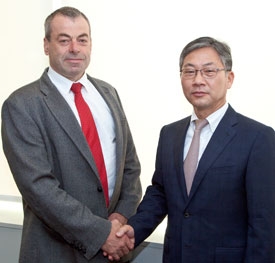LG’s fuel cell technology development
 By combining fuel and air in an electrochemical reaction, a fuel cell can generate electricity through chemistry and is capable of achieving lower carbon emissions. To this end, fuel cell technology is considered a ‘next-generation’ energy source, offering tremendous potential in terms of efficiency, safety, durability, and sustainability.
By combining fuel and air in an electrochemical reaction, a fuel cell can generate electricity through chemistry and is capable of achieving lower carbon emissions. To this end, fuel cell technology is considered a ‘next-generation’ energy source, offering tremendous potential in terms of efficiency, safety, durability, and sustainability.
Under the terms of the deal, Rolls-Royce Fuel Cell Systems, which is based in North Canton in the State of Ohio, has changed its name to LG Fuel Cell Systems.
The business will continue to further the research, development, testing and commercialisation of solid oxide fuel cell technology aimed at megawatt-scale distributed power generation for industrial, commercial, and electric utility markets and applications.
“This strategic investment will transition fuel cells towards commercialisation. LG will contribute significant expertise in high volume manufacturing, controls, power electronics and industrialising technology, and expects to commercialise fuel cells for generating power within for years,” according to a LG source.
In-Jae Chung, currently executive vice president of LG Electronics, had been appointed CEO of LG Fuel Cell Systems.
Chung is in charge of New Energy TFT and has contributed to developing TFT-LCD and next-generation display technologies for more than 25 years.
LG’s flagship subsidiaries, LG Electronics and LG Chem, which produce solar batteries and energy storage system (ESS) respectively, keep the South Korean conglomerate at the forefront of power generating systems.
Rolls-Royce is a world-leading provider of power systems and services for use on land, at sea and in the air and has established a strong position in global markets - civil aerospace, defence aerospace, marine and energy.
What the stars mean:
★ Poor ★ ★ Promising ★★★ Good ★★★★ Very good ★★★★★ Exceptional
Related Contents
Latest News
More News
- State corporations poised to drive 2026 growth (February 03, 2026 | 13:58)
- Why high-tech talent will define Vietnam’s growth (February 02, 2026 | 10:47)
- FMCG resilience amid varying storms (February 02, 2026 | 10:00)
- Customs reforms strengthen business confidence, support trade growth (February 01, 2026 | 08:20)
- Vietnam and US to launch sixth trade negotiation round (January 30, 2026 | 15:19)
- Digital publishing emerges as key growth driver in Vietnam (January 30, 2026 | 10:59)
- EVN signs key contract for Tri An hydropower expansion (January 30, 2026 | 10:57)
- Vietnam to lead trade growth in ASEAN (January 29, 2026 | 15:08)
- Carlsberg Vietnam delivers Lunar New Year support in central region (January 28, 2026 | 17:19)
- TikTok penalised $35,000 in Vietnam for consumer protection violations (January 28, 2026 | 17:15)

 Tag:
Tag:

















 Mobile Version
Mobile Version